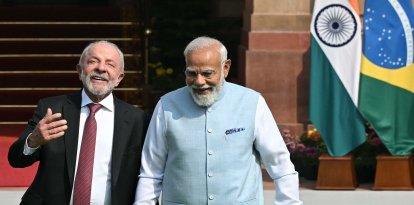The war between Elon Musk and the Brazilian justice system continues: The businessman claims that X employees have been threatened with arrest
Brazil's highest court has launched an investigation against the owner of X for allegedly backing criminal organizations accused of spreading disinformation.

(Cordon Press)
Elon Musk is leading a crusade in favor of freedom of expression against the Brazilian justice system which has accused him of "obstruction of justice, membership in a criminal organization and incitement to crime." Musk publicly condemned that his employees in Brazil were threatened with arrest.
Musk first targeted Alexandre de Moraes, a member of the Supreme Court of Brazil, and then responded on X to local politician Nikolas Ferreira.
"We need to get our employees in Brazil to a safe place or otherwise not in a position of responsibility, then we will do a full data dump. They have been told that they will be arrested," he added on Monday.
Regarding de Moraes, who was appointed to the country's highest court by former president Michel Temer, Musk posted the following: "How did Alexandre de Moraes become the dictator of Brazil? He has Lula on a leash."
Musk's comments came a day after the Brazilian justice system forced X to block popular accounts in Brazil. "Coming shortly, X will publish everything demanded by [Alexandre Moraes] and how those requests violate Brazilian law. This judge has brazenly and repeatedly betrayed the constitution and people of Brazil. He should resign or be impeached. Shame Alexandre, shame," Musk said last Sunday.
Brazil's Supreme Court investigates Musk for "criminal instrumentalization" of X
Given Musk's stance, an investigation was opened against him for allegedly supporting criminal organizations accused of spreading disinformation.
"The conduct of ‘X’ constitutes, in theory, not only abuse of economic power, by trying to ILLEGALLY impact public opinion, but also flagrant induction and instigation to maintain various criminal conducts practiced by the digital militias investigated, aggravating the risks to the safety of the members of the Supreme Court - as is easily seen in the various messages with hateful content made in support of those posted by Elon Musk - and to the democratic rule of law itself," according to the Supreme Court's investigation.
In turn, X was warned that the justice system would impose a fine of $20,000 per day for each profile Musk reactivates on the platform.
The Brazilian version of Twitter Files
Journalist Michael Shellenberger revealed a network between the state apparatus and the Brazilian justice to silence dissident voices, impose unconstitutional restrictions on X users and illegally spy on them.
According to Shallenberger, Moraes violated the Brazilian Constitution by requiring the company, which at that time was Twitter, to reveal private information of certain users who used hashtags considered "inappropriate" by the judge. In turn, Moraes "censored, on his own initiative and without any respect for due process, posts on Twitter by parliamentarians from the Brazilian Congress."
Given Twitter's refusal to give in to the demands of a member of the Supreme Court, Lula's government attempted to sue the social network's main lawyer.
As reported by local media Revista Oeste, Moraes' actions violate at least four articles of the Abuse of Authority Law (Law 13,869/2019).
"At this moment, Brazil is not yet a dictatorship. It still has elections and the Brazilian people have other means at their disposal to confront authoritarianism. But the Federal Supreme Court and the Superior Electoral Court are directly interfere in those elections through censorship. ... And Moraes tried to turn Twitter's content moderation policies into a weapon against supporters of then-president Jair Bolsonaro," Shellenberger wrote in a post on X that was viewed over 15 million times.
The 'Twitter Files of Brazil' also affected other large companies, such as Google, Facebook, Uber, WhatsApp and Instagram, whose managers gave in to Moraes.
"If such evidence is proven, the executives of these companies behaved like cowards: they provided the Brazilian government with personal registration data and telephone numbers without a court order and, therefore, violating the law," the journalist added.
























